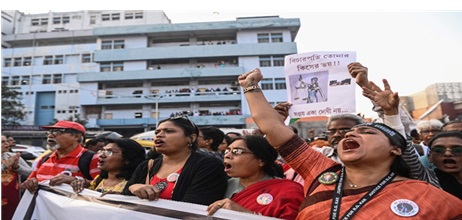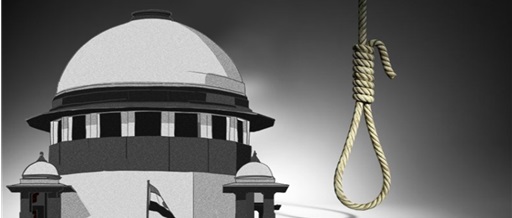Why in the NEWS?
- A Kolkata sessions court on Monday sentenced Sanjoy Roy, convicted of rape and murder of a doctor of RG Kar Medical College and Hospital, to life imprisonment.

Key Points:
- Kolkata Sessions Court has sentenced Sanjoy Roy, convicted of rape and murder of RG Kar Medical College doctor, to life imprisonment.
- Sealdah Court Additional Sessions Judge Anirban Das said that this is not the 'rarest of the rare' case, so capital punishment is not required.
- The court imposed a fine of Rs. 1 lakh on the convict and ordered the state government to pay Rs. 17 lakh compensation to the victim's family.
- The West Bengal government has filed an appeal against this verdict in the Calcutta High Court, seeking to convert the life imprisonment into death penalty.
What will you read next in this topic?
- What is the matter?
- Circumstances that may avoid death penalty:
- Aggravating circumstances that turn the court's decision towards the death penalty:
- The main circumstances considered by the court in death penalty cases are: age, nature of crime and possibility of reformation:
What is the matter?
- On August 9, a trainee doctor was raped and murdered at RG Kar Medical College in Kolkata.
- The doctor's body was found in a semi-nude state, indicating a heinous crime.
- On August 10, the police detained civic volunteer Sanjay Roy as a suspect and the accused was charged with rape and murder.
- After the incident, doctors and the public protested in Kolkata and other parts.
- The Calcutta High Court took suo motu cognizance of the matter.
- The court stressed the need for strict action against the accused.
- The Supreme Court also took suo motu cognizance of the matter and expressed concern over the safety of doctors.
- The Supreme Court, headed by Chief Justice DY Chandrachud, directed to prepare a national protocol for the safety of doctors.
- Along with this, a 10-member task force was formed to find a solution to the problem and ensure the safety of doctors.
Circumstances that may avoid death penalty:

- Extreme mental or emotional disturbance:
- If the accused was under the influence of extreme mental or emotional disturbance at the time of the crime, it may be an important reason to avoid the death penalty.
- Age of the accused:
- If the accused is very young (juvenile) or very old, he cannot be awarded the death penalty, as it would be an inappropriate form of punishment considering his mental state and physical capacity.
- Possibility of continuing danger to society:
- If the accused is not likely to pose a continuing danger to society in future, it may be a ground to avoid the death penalty.
- Possibility of reformation of the accused:
- If the accused is likely to reform and can be rehabilitated through reformative measures, there may be a possibility of escaping the death penalty.
- Committing the crime at the direction of another person:
- If the accused had committed the crime at the direction of another person, it may be an important reason to save him from the death penalty.
- Belief of morally rightful act:
- If the accused believed that his act was morally rightful, it can be a ground to escape the death penalty considering his mental condition.
- Mental disorder:
- If the accused is suffering from a mental disorder and is unable to understand the criminality of his act, it can be an important circumstantial factor to escape the death penalty.
Aggravating circumstances that turn the court's decision towards the death penalty:
- Premeditated and brutal murder:
- If the murder is premeditated and involves extreme cruelty.
- Exceptional depravity:
- If the murder involves extreme brutality and inhumanity.
- Murder of a public servant or police officer:
- If the murder is committed in the course of duty of a public servant, police or member of the armed forces.
The main circumstances considered by the court in death penalty cases are: age, nature of crime and possibility of reformation:
- Age of the accused:
- Young age (below 30 years) is considered as a possibility of reformation, such as in Ramnaresh vs State of Chhattisgarh (2012) and Ramesh vs State of Rajasthan (2011).
- However, the Law Commission has found age to be "infrequently" used as a factor in reducing death penalty.
- Nature of crime:
- In the Shankar Khade case, the court said that the crime must be compared with similar crimes before deciding the sentence, otherwise the sentencing decision may be "subjective".
- In Machhi Singh vs State of Punjab (1983), if the crime offends the "collective conscience" of society, then the death penalty can be awarded.
- Possibility of reformation:
- The Supreme Court said in the Bachan Singh case that the government has to prove that there is no possibility of reformation.
- In Santosh Bariyar v State of Maharashtra (2009), the Court held that the court needs clear evidence that the convict is not suitable for a correctional or rehabilitation plan.
- Trial phase:
- In Bachan Singh, the Court held that a separate trial should be held after conviction, so that the death penalty can be considered.
- In Datta Ray v State of Maharashtra (2020), the Court held that if there is no separate trial, the death sentence can be commuted to life imprisonment.
- Suo motu proceedings:
- The Supreme Court asked whether sentences pronounced on the day of conviction meet the requirement of a meaningful and effective trial.
- The Court held that aggravating circumstances are always available, even when recorded on record before sentencing, which may cause harm to the convict.
|
Q. Which of the following circumstances can cause the accused to escape the death penalty?
(a) Extreme mental or emotional disturbance at the time of the crime
(b) Surrender of the accused
(c) The accused being an accomplice in the crime
(d) Confession of the crime by the accused
|



